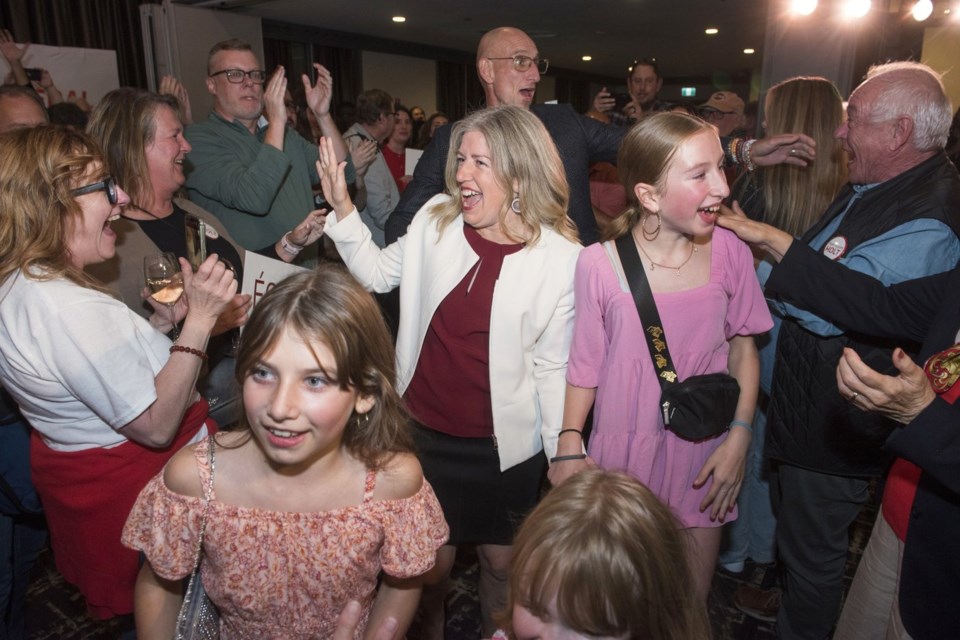Here is a roundup of stories from The Canadian Press designed to bring you up to speed...
Liberal victory shifts political landscape in N.B.
New Brunswickers are waking up to a transformed political landscape, after the Liberal Party ended six years of Progressive Conservative rule in Monday's provincial election.
Winning 31 of 49 seats, Susan Holt's Liberals delivered a convincing majority win, with the Tories winning 16 seats and the Greens two.
Holt has become the first woman premier-designate in the province's history.
She credits the victory to her campaign's focus on health care and affordability — she is promising to open 30 community health clinics across the province, to remove the provincial sales tax on electricity bills, and to cap rent increases.
The Liberals' win signals a shift away from the socially conservative policies of Higgs, and opens the door to a mending of relations between the province and Indigenous Peoples, who have been highly critical of the Tories.
Here's what else we're watching...
NDP and SaskParty leaders both have events today
NDP Leader Carla Beck has two planned campaign events today, starting the day with an availability in Moose Jaw and then later this evening attending an event in the capital with the Regina Medical Staff Association.
Saskatchewan Party Leader Scott Moe, meanwhile, will speak in Prince Albert at the start of Voting Week in the province.
Saskatchewan residents can vote for five days starting today in the lead-up to next week's provincial election, although polls won't be open Sunday.
The NDP and the Saskatchewan Party are urging voters to cast their ballots early.
Voters can find their polling stations on their information cards or by visiting the Elections Saskatchewan website.
Chief electoral officer Michael Boda says there are about 810,000 registered voters in Saskatchewan.
Businesses worried about U.S. protectionism: poll
A new report says many Canadian business leaders are worried about economic uncertainties related to the looming U.S. election.
The survey by KPMG in sa���ʴ�ý of 735 small- and medium-sized businesses says 87 per cent fear the Canadian economy could become "collateral damage" from American protectionist policies that lead to less favourable trade deals and increased tariffs
It says that due to those concerns, 85 per cent of business leaders in sa���ʴ�ý polled are reviewing their business strategies to prepare for a change in leadership.
The concerns are primarily being felt by larger Canadian companies and sectors that are highly integrated with the U.S. economy, such as manufacturing, automotive, transportation and warehousing, energy and natural resources, as well as technology, media and telecommunications.
Both presidential candidates have campaigned on protectionist policies that could cause uncertainty for Canadian trade, and whoever takes the White House will be in charge during the review of the United States-Mexico-sa���ʴ�ý Agreement in 2026.
Thousands of foreign students miss fall semester
Thousands of international students expected to study at three Ontario colleges are missing the fall semester, after Ottawa announced it would further tighten sa���ʴ�ý's study permit system.
Some school officials are attributing the dramatic enrollment decline to a chilling effect created by the federal government's policy, and to visa delays that have resulted from a stricter approach.
Glenn Vollebregt, the president of St. Lawrence College in Kingston, Ont., said his college was expecting 1,600 new international students this fall, but only 775 are enrolled in courses.
Ottawa announced in January it would cap international study permits in 2024.
Last month, Immigration Minister Marc Miller announced he would lower the cap by another 10 per cent, meaning some 300,000 fewer permits would be issued over the next few years. sa���ʴ�ý plans a limit of 437,000 study permits in 2025 and 2026.
Sentencing hearing continues for UWaterloo stabber
A sentencing hearing is set to continue today for a man who pleaded guilty to four charges in a triple stabbing in a University of Waterloo gender studies class.
Geovanny Villalba-Aleman has pleaded guilty to two counts of aggravated assault, one count of assault with a weapon and one count of assault causing bodily harm in the June 2023 attack.
Federal prosecutors say the offences amount to terrorism in his case.
The professor and two students who were stabbed told a Kitchener, Ont., court Monday they remain fearful and anxious, particularly on campus.
The professor said she worries others may be inspired to commit similar acts of violence.
The hearing is expected to span several days this week.
This report by The Canadian Press was first published Oct. 22, 2024
The Canadian Press


